Stifyn Emrys's Blog, page 3
March 5, 2013
Kiersten White's 'Supernaturally' a Strong Sequel to 'Paranormalcy'
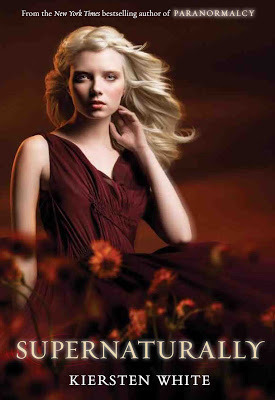
Most books don't keep me up past bedtime. I'm one of those readers who can disengage from a story pretty easily when the old eyelids start to get heavy. But the last 100 pages of Supernaturally kept me awake into the wee hours.
The novel continues the adventures of Evie, a 16-year-old girl caught between two worlds - everyday existence as a high school student and her identity as a gifted "empty one" whose adventures in the paranormal realm are anything but ordinary.
If you enjoyed the first book in this trilogy, Paranormalcy, chances are you'll like this one, as well. Kiersten White's writing stands out for a couple of reasons. Her first-person approach is so effortless it requires virtually no exertion on the part of the reader. Evie's voice is conversational and believable, and it allows the reader to get comfortable inside her head. But not too comfortable. Another thing White has done well is create a character who's complex and not always lovable. You'll root for her throughout, but you won't always agree with her decisions. Sometimes, you'll probably even say to yourself, "What the bleep is she thinking?"
This series is packed with a cast of paranormal creatures that will seem familiar (vampires, faeries, werewolves, selkies, etc.), but the world White has populated them with is unique and creative. Her shapeshifting water-based boyfriend is particularly noteworthy, and a new addition to this book - the aptly named Jack - adds a new dimension that gives the book a fresh feel.
This book is part mystery, and it's solved with a nice twist I didn't see coming. The least interesting part of the book is the day-to-day teenage interactions, but they're necessary to set up the more extraordinary elements of the story and to illustrate the tension between the two worlds in which Evie lives. She's drawn to both of them for different reasons, and the conflict between the desire for peace and the lure of adventure is something most readers can relate to.
Perhaps the best recommendation I can offer is the fact that these books worked so well for a 49-year-old male such as myself thoroughly enjoyed a book centered on the life of a teenage girl. That's testimony to the author's ability to tell a good story. A strong story with well-drawn characters can work regardless of the setting or genre, and that's what this is.
Rating: 5 stars.

Published on March 05, 2013 16:52
Announcing the Release of 'Artifice: An Identity Quest Story': Only 99¢
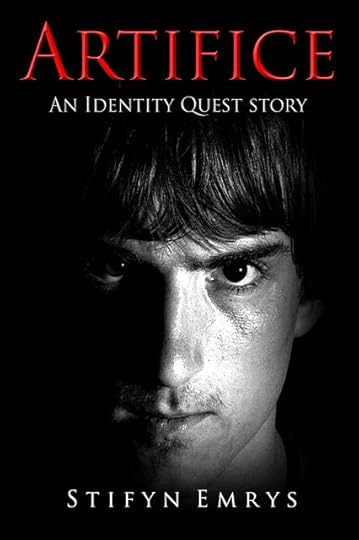
I'm pleased to announce the release of "Artifice: An Identity Quest Story" in paperback and e-book form. "Artifice" is a novella that pairs with the first installment in the series, "Identity Break," and can be read either before or after that book.
My challenge in writing "Artifice" was to create a story that complemented "Identity Break" without giving anything away. (There are some nice twists in the first installment that I didn't want to ruin.) The idea was to answer some of the questions I purposely left hanging in "Identity Break" and help lay the groundwork for some plot turns that lie ahead in the next installment of the planned trilogy.
"Artifice" has a little more romance to it than "Identity Break" did, but it's still very much an action/adventure novel, and I wanted to keep it fast-paced throughout. I'm confident that readers who enjoyed the first book will enjoy this one, as well. The best part is it's just 99 cents on Kindle. If you want a cheap way to figure out whether this series is for you, it's a great opportunity to give it a try, and if you already read and enjoyed "Identity Break," it's a little something to hold you over until the next full novel is released this summer - or sooner if I can manage it.
There's another bit of news worth mentioning: "Identity Break" will be going on a book blog tour with Chick Lit + from May 13-27. I'll be posting links to the reviews and interviews from that tour here.

Published on March 05, 2013 13:12
March 3, 2013
Extremism, Appeasement and the Third Option: Scientific Thought

Confirmation bias. These two words are among the biggest obstacles to rational thought we face.
We've all experienced it, and at some point in time, we've all engaged in it. Confirmation bias is a tendency to prefer information that confirms what we already believe. It's why conservatives listen to Rush Limbaugh and Sean Hannity; it's why progressives confine themselves to liberal-leaning websites. To use a well-worn phrase often quoted in Pagan circles, "like attracts like." While this may not always be true, it certainly is in this case.
It's natural. There's even a First Amendment protection for it: freedom of association. We have every right to hang out with the people we want to be around.
If allowed to run its course, however, confirmation bias leads to an even more toxic condition: absolutism. It works like this: the more we allow our beliefs to be reinforced by like-minded people, without allowing ourselves to be challenged by people who think differently, the more extreme we become. Eventually, we become so extreme we become absolutists. Our mantra becomes, "No one will ever, under any circumstances ... (fill in the blank).
I'm not going to actually fill in the blank with specific issues here, because we all know what they are. They've been argued on websites and media outlets ad nauseam. The point here isn't to get sidetracked into a debate over specific issues, it's to focus on the thought process behind those issues.
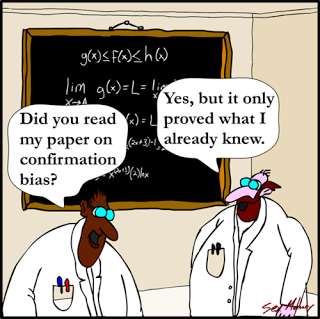
Our current media culture encourages confirmation bias. There are so many narrowly focused, specifically targeted blogs, cable networks, Facebook pages and Twitter accounts that we can easily isolate ourselves and limit our exposure to those who think differently. We create a cocoon around ourselves and turn on a numbing sound loop of endlessly repetitious endorsements of what we already know. Or think we know.
This process has created a politically polarized country where very little is accomplished because the two sides are too far away from each other to see the middle, much less meet in it. But it has also created a backlash from a group so tired of chaos and confrontation that they throw up their hands and say "live and let live" about pretty much anything. Unfortunately, that mentality is just as foreign to rational thought (and in some senses, just as absolute) as the mindset at either extreme. Accepting everything as valid is just as harmful as accepting only what we already believe.
So here's the situation: We have cookie-cutter absolutists at both ends, with disengaged "let's just all get along, whatever it takes" folks in the middle.
There is, fortunately, a third alternative: having the courage to believe what you believe even if you don't fit the mold and - even more importantly - to modify your beliefs if they don't square with the facts. This is, of course, the scientific approach.
Unfortunately, it won't make you popular with any of the aforementioned groups. Absolutists on both sides will deride you as disloyal, heretical and worse because you don't follow the party line. The laissez-faire folks in the middle won't like you, either, because you're rocking the boat at both ends and they're getting seasick. They don't care who wins; they just want to avoid conflict at any cost by sticking their heads in the sand and hoping it all goes away on its own. Of course, it won't.
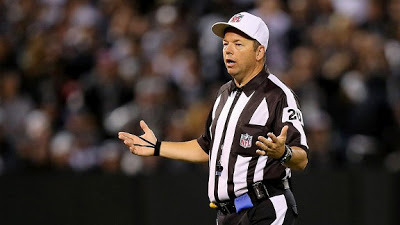
Scientific thinkers are the world's referees. We get pelted with tomatoes from both sidelines and accused of bias by partisans of every sort. Take me, for example. I'm an author who has written a book about Jesus called The Gospel of the Phoenix . It paints Jesus in a positive light, which doesn't sit too well with some atheists and Pagans who want nothing whatsoever to do with Jesus or may not believe he even existed; but that doesn't mean fundamentalist Christians will like it. Just the opposite: they're not likely to approve of a narrative that questions several tenets of their theology.
Another book of mine, Requiem for a Phantom God , draws even stronger protests. The book points out the logical inconsistencies of monotheistic beliefs (Judaism, Christianity, Islam). This is, of course, not popular with people who hold those beliefs. But those who don't tend to react in a couple of different ways:
"Thank you for writing this book! It reinforced everything I always thought about why all Christians are such idiots!""How dare you criticize another person's religious belief! We need to respect the beliefs of others and show tolerance. How would you like it if your beliefs were attacked that way?"These quotes are paraphrased, but they fairly well convey the responses I've received to this work from Pagans who have read the book.
Both miss the point entirely. The book is not intended to reinforce beliefs (confirmation bias). Nor is it meant as an excuse to vilify "all" members of a particular group or dismiss every teaching of a particular religion. On the contrary, it's intended to raise significant questions about elements of Christian dogma and monotheism in general that, I think, are illogical and may promote or justify harmful actions such as slavery, misogyny, bigotry, oppression, murder and so forth.
I'm not condemning "everything" about Christianity or Judaism or Islam, each of which has many positive teachings to offer. "Love thy neighbor" (harm none?) and "reap what you so" (karma, anyone?) come to mind.
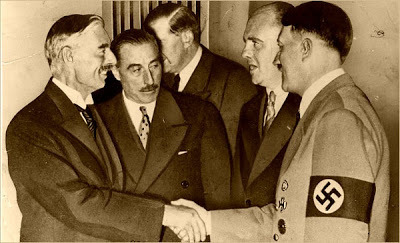 Appeasement: U.K. Prime Minister Neville Chamberlain and Hitler, 1938.
Appeasement: U.K. Prime Minister Neville Chamberlain and Hitler, 1938.On the other end, the hands-off position taken in the second quote misses the point just as badly. Religion has too often been used as an excuse to perpetrate atrocities. The terrorist jihads of Islam, along with the crusades and witch hunts of Christianity, are based on dogmatic beliefs and interpretations that must be condemned in the strongest possible terms, not excused on the basis of religion. We tried the whole "live and let live" approach with Nazi Germany during World War II. It was called appeasement, and it didn't work.
There's a proverb equates wisdom with harlotry, and I think there's something to that. Wisdom is not faithful to any dogma, but follows her own course and will share herself with anyone willing to pay the price: open-mindedness and sincerity. Like referees, harlots tend to be reviled. So do scientific thinkers, because neither side in any debate can count on them for support, and the price to have it may be steep - that price is a continual re-examination of one's self and the facts in evidence (both of which are always changing).
Is it possible to be both civil and open-minded on the one hand, yet unyielding in the face of abuse and tyranny? Absolutely. Don't ask me to condemn any broad group en masse as "a bunch of idiots." That doesn't fly with me. But neither will I stand idly by and allow religious doctrine to become an excuse for atrocity. Don't ask me to "tolerate" that based on some live-and-let-live mantra. It reminds me more of that old Paul McCartney song, Live and Let Die.
If all this leaves me as a referee in the game of life, I consider it a noble position - and not one to which I'm uniquely called. In fact, I believe it's a challenge to which we all can and should rise.
Yes, that's an absolute statement. You can go ahead and pelt me with tomatoes now.

Published on March 03, 2013 12:13
February 23, 2013
Short Memoir 'The Death of Me' Packs a Powerful Emotional Punch
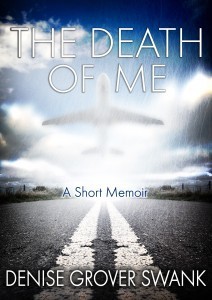
"The Death of Me" is a true story, a memoir of the author's ordeal after her husband is severely burned in a plane crash. It's a vividly personal and deeply affecting account that illustrates how wrenching and harrowing the process of grieving can be - especially when you don't know whether to grieve or not. Or what to grieve.
Denise doesn't pull any punches in describing the self-doubt, anger and uncertainty she felt while her husband lay helpless in a hospital bed. She questions her decisions, her faith and her own motives. She talks about the challenges of being there for a husband who's seldom conscious and not being there at times for her children when they needed her.
At a certain point in the story, she begins to insert flashbacks to her life with her husband before the accident. This was a wonderful touch, as it helped the reader connect with the essence of their intense, yet entirely human (and sometimes strained) relationship. As I was reading this, I found myself wishing she had inserted more of these flashbacks earlier in the narrative, but I think I understand why she structured it as she did, and that decision may well reflect her own state of mind as she was going through this nightmare. If so, it is deftly done.
This is a story of the grieving process. If you've ever felt stuck in a situation that doesn't seem to get better but still offers the slightest, elusive hope of a happy ending, you will be able to relate to this book. Whether you are grieving a loved one, a relationship or anything else on the precipice of death, you will be able to relate to this.
I can't personally imagine how Denise wrote this book, and she herself has called it the hardest thing she's ever written. Her emotional honesty gives it a raw feeling that draws the reader through to the end (it's short at 9,000 words, and I read it in a single sitting). I don't think I could have brought myself to revisit such pain, but the author does us a huge service by doing so here. She produces a book many readers will be able relate to on an emotional level, even if the events themselves are far more awful than what many of us will ever face.
Yes, it's the story of grieving, but it's also a story of love - not fairy tale love with knights in shining armor and happily-ever-afters, but the real love of one flawed, confused yet determined human being for another. It's a story about human limits and how love can help us transcend those limits: about how it's always sufficient and, yet, sometimes, isn't quite enough.
Rating: 5 stars.
Available on Amazon and Barnes & Noble.

Published on February 23, 2013 11:46
February 21, 2013
Fox News' Anti-Wiccan Diatribe Insulted Pretty Much Everyone
"I am really only interested in new information, not freelance opinion. I don't really care what you think off the top of your head." - Tucker Carlson

Actually, that goes both ways.
It’s a no-brainer that Wiccans and Pagans would be offended by the diatribe/mockery of them that aired on Fox News this week. But they’re not the only groups likely to take offense at this three-minute pastiche of bigotry, inaccuracy and character assassination.
In this short span of time, the three people on this panel managed to insult midwives, rural residents, middle-aged women, divorcees, people who burn incense, individuals who enjoy celebrating holidays - especially Halloween - and folks who play Dungeons & Dragons. (Considering it’s Fox News, I doubt they’d ever speak with such disdain about that venerable symbol of free-market capitalism, Monopoly … unless, of course, it was to criticize that new “witchy” playing piece, the dreaded cat.)
As if all that bias isn’t bad enough, the entire piece is a flagrant insult to another group of individuals: journalists.
Let me be clear about a couple of things. First, though I have a number of friends who consider themselves Wiccan, I do not personally practice Wicca. Second, I’ve worked my entire career - more than 25 years now - as a professional journalist. In that time, many things have changed. There has been a gradual, yet steady blurring of the lines between reporting and opinion. Between news and entertainment. These days, it’s sometimes difficult to tell where one ends and the other begins.
As visual media sources have multiplied from the “Big Three” television networks to thousands of cable choices and a virtually limitless number of options online, news providers have been forced to target niches rather than try to serve a broad spectrum of consumers. This has meant that media outlets are increasingly targeting either liberals or conservatives (but not both). More specifically, they’re often aiming for narrowly focused and even single-issue audiences.
This trend both reflects and contributes to the increased political polarization we see in the United States. Few liberals even watch Fox News anymore, so it feels it can operate in a cocoon and say pretty much whatever it wants. To be fair, few conservatives probably pay any attention to Bill Maher, for instance, and he says pretty much what he wants, too. One could argue that Maher is a comedian, but he’s also a political commentator and one of the best examples of someone who has blurred the lines between news and entertainment.
But the crucial point is this: The more we hang out exclusively with like-minded individuals, the more our own opinions are reinforced and the less opportunity we have to be challenged by opinions we may not agree with. We become so isolated from one another that we adopt rigid ideologies that sometimes include laundry lists of dos and don’ts. Liberals are “encouraged” through peer pressure to adhere to a checklist of political positions, and all conservatives are similarly “encouraged” to do the same. Deviation from the norm opens the individual up to ridicule, derision or shocked holier-than-thou reactions.
In the interest of full disclosure, I should state that I’m an unabashed liberal on most issues. But not on all. I actually happen to agree with critics who say liberals have a tendency to be too politically correct. But (and this is a big but), I’m also fully convinced that conservatives are just as badly ensnared by political correctness as liberals are. Probably more so, because conservative philosophy, by its very nature, seeks to maintain the status quo, whereas liberals and progressives seek to … well … progress beyond it.
I found it interesting - and comical - that Fox’s Wicca-bashing segment was marked with the tagline “P.C. Police,” as in politically correct. The implication is that Fox’s staff was diligently tracking down and exposing political correctness. Nothing, however, could be further from the truth. In fact, the biased commentary that followed couldn’t have possibly been morepolitically correct to Fox’s audience. It hit all the right buttons: the supposed sanctity of marriage (in its ridicule of divorcees), upholding the conservative concept of American “tradition,” patriarchal bias (in its derision toward midwives and women in general), and its mockery of all minority traditions.
I’ve come to expect this sort of bias from Fox News. It’s part-and-parcel of the modern media strategy of “preaching to the choir” - or, in other words, being politically correct. The segment is, tellingly, called Fox & Friends. In other words, people who disagree with Fox’s conservative political bent (and therefore are not “friends”) aren’t welcome … unless, of course, they can sit through enough of the show to get hooked on one of its sponsors’ products. Then it’s all good.
To be perfectly honest, though, all journalism is biased for the simple reason that all human beings are biased. Some shoot for objectivity and miss; others don’t even bother to try. Fox generally falls into a third category: It doesn’t bother to try, but insists that it’s actually succeeding at being “fair and balanced.” If that’s not Orwellian, I don’t know what is.
And that brings me to what’s even more, from a journalistic perspective, about this segment in particular and Fox’s approach in general: its blatant disregard for the facts.
Not 15 seconds into the segment, Tucker Carlson declares that “there are more Zoroastrians here than there are Wiccans.” Sorry, Tucker, you just flunked your audition for Jeopardy! In 2006, there were 11,000 Zoroastrians in the United States. Five years earlier, according to religioustolerance.org, there were 408,000 adult Wiccans in the country. That means, not counting children, there were 37 times as many Wiccans as there were Zoroastrians in this country.
How absurd is Carlson’s claim? It’s tantamount to saying West Virginia is larger, in terms of area, than Alaska. (In fact, it’s worse: Alaska is only 27 times as large as West Virginia).
Carlson sticks his foot in his mouth again by twice incorrectly referring to Wicca as “Wiccanism” (how upset would Christians be if he started calling Christianity “Jesusism”?).
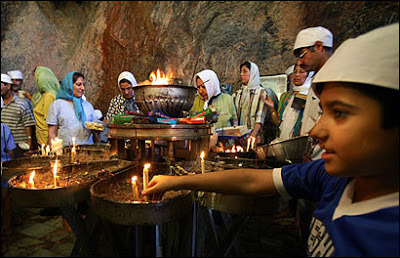 Zoroastrians or Wiccans? You decide.
Zoroastrians or Wiccans? You decide.Clayton Morris, another panelist on the show, later sticks his foot in his mouth by claiming that “you get 20 holidays if you’re a Wiccan. I guess that’s the one you’re going to go with. If you’re going to pick one, go with the one with the most holidays.” Morris is wrong on two counts here. First, Wicca generally recognizes eight sacred days (four major and four minor sabbats), not 20. Second, Wicca doesn’t have the most holidays. That honor would go to Catholicism, which pays tribute to a different saint every day of the year and even has one day that covers all the rest - All Saints Day. Otherwise known as the day after All Hallows Eve, or Halloween.
Carlson evidently has a bias against Catholic holy days, since he thinks Halloween is a joke: “Any religion whose most sacred day is Halloween I can’t take seriously,” he declared. “I mean, call me a bigot. I’m not, you know, offering an editorial against Wiccans.”
Come on, Mr. Carlson, of course you are. And your comments were, in fact, bigoted. Saying you’re not a bigot is about as convincing as declaring Fox News to be fair and biased simply because it says it is. But if you’re going to act like a bigot, the least you could do is get your facts straight. Wiccans do not celebrate Halloween. They celebrate Samhain, a pre-Christian sacred day that happens to fall on the same day.
Morris seemed to recognize that the discussion lacked any semblance of fairness or balance, when he remarked, “I will say this, because we are journalists and I have covered this. … I had to do a story and I went and interviewed a number of Wiccans. And they say look, we are the most peaceful individuals. We don’t practice crazy things. We’re just of the Earth.”
Notice the phrasing. First, Morris goes out of his way to assert that he and his fellow panelists are journalists. Why? Because they sure as heck aren’t acting like journalists. But he then goes on to contradict his assertion by inserting more bias into the discussion by saying he “had to” do a story on Wicca - it wasn’t something he wanted to do.
More bias and falsehood is interjected into the discussion at various points by Tammy Bruce (speaking on tape), Carlson and, to a lesser extent, Anna Kooiman. There’s too much of it to address it all here, which should tell you something about exactly how packed with derision and dismissiveness this segment was, since it was just three minutes long.
Carlson came out with a wannabe apology a couple of days afterward: “I don’t spend a lot of time on Twitter, so I’m not sure of the dimensions of it, but I’m pretty sure that I’m unpopular in the witchcraft community, and I understand why. I probably was unduly harsh. As far as I know, most Wiccans are peaceful taxpayers. I’ve never been mugged by one anyway. So I apologize for hurting anyone’s feelings.”
This sounds an awful lot like he’s covering his posterior, considering his proclamation on Fox that “the bad side of Wiccanism is it’s obviously a form of witchcraft.” In other words, he’s made a moral judgment (that witchcraft is something “bad”). Either 1) he learned a lot about Wicca in the ensuing 48 hours that caused him to change his mind, 2) his initial statement was deliberately inflammatory or 3) his apology was disingenuous.
Personally, I’m reminded of a ruthless TV trial lawyer who makes shockingly prejudicial statements in front of a jury, then “withdraws” them when the opposition objects. Sure, you can strike them from the record, but the damage is done: harsh impressions left in a jury’s mind are not easily erased. The same principle applies to the minds of those who tune in to watch Fox & Friends.
Compounding the issue is the fact that, Carlson didn’t make this apology on the Fox & Friends show where the original comments were made, and he also soft-pedaled it by saying he “probably” was unduly harsh.
I’m sorry, but there’s no “probably” about it.
The other three panelists? To my knowledge, issued any sort of mea culpa.
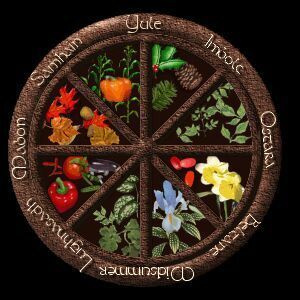 The Wheel of the Year.
The Wheel of the Year.As of this writing, more than 33,000 people have signed a petition calling for an on-air apology (yes, that’s more than three times the number of Zoroastrians in the United States). It’s worth it to hold Fox’s feet to the fire. At the same time, however, we shouldn’t get too hopeful about the prospect of changing attitudes by appealing to actual facts as a counterweight to Fox’s error-laden diatribes.
Facts, sadly, don’t seem to change people’s minds. Often, they have the opposite effect. A study in 2005 and 2006 at the University of Michigan discovered an interesting phenomenon: Misinformed people - especially political partisans - rarely changed their minds in response to corrected facts. To the contrary, they became even more firmly convinced of their false beliefs.
That won’t come as a surprise to anyone who has watched the polarization and pigheaded partisanship of American politics over the past several years. But it certainly isn’t encouraging.
Stifyn Emrys is a journalist, blogger and author of several books, including “The Gospel of thePhoenix” and the novel “Identity Break.” all of which are available in paperback, Kindle and Nook formats. He burned incense as he wrote this, but he never got into D&D and he doesn't personally know any midwives. Follow him on Facebook at www.facebook.com/semrys.
Published on February 21, 2013 16:35
February 17, 2013
Kiersten White Does for Paranormal Fiction What 'MIB' Did for Aliens
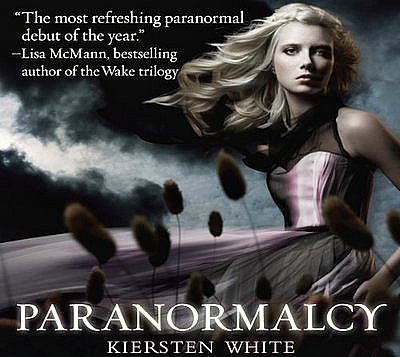
I just finished this first book in Kiersten White's "Paranormalcy" series and enjoyed it immensely. The writing is crisp and keeps the story moving along at a brisk pace throughout. The flow of the book was perfect, and the tone was light and fun.
The author does a great job of capturing teenage insecurity, then transferring it to a world that's not quite our own. She doesn't just describe situations, but she really gets at Evie's feelings about everything that's going on, which is one thing that separates a great author from an average writer, in my book. Her conflicted emotions toward her adoptive mother figure seemed particularly natural and human in a very superhuman world. The tone is somewhat similar to that of the "Magic Kingdom of Landover" series by Terry Brooks, another series I thought was great: quirky, a little serious and a lot of fun, all at the same time.
The beginning of the book reminded me a lot of "Men in Black," as though the author had created a similar universe of odd other-than-human individuals, substituting paranormals for aliens. The idea that a secret undercover organization is keeping tabs on paranormals who hide right under our noses was a natural offshoot of the MIB concept, though I have no idea whether that film played any part in inspiring this series. The characters and story line here are certainly original, which quickly eliminates the feeling that White's work is in any way derivative.
The "villains" here are well-crafted. I really couldn't stand Reth - which is a good thing, because the reader isn't supposed to like him - who felt like the sort of rogue you might find in a Neil Gaiman work (done American style). Like the protagonist, I became more than annoyed at the way he never fully explained his motives. I found myself saying, "Of course she didn't go along with your plan, since you didn't bother letting her in on what it is!" Vivian was nicely drawn in that she wasn't a one-dimensional villain. You could understand her motivation for being the way she was, and like Evie, in some ways, it's possible to feel a bit sorry for her.
Lend (a character's name) is a great, sympathetic romantic interest for Evie. I enjoyed the fact that the requisite romantic interest wasn't overplayed. It wasn't some all-encompassing angst-ridden "Twilight" sort of thing; more a tender and playful tale of discovering the opposite sex. It didn't overpower the main story line, but instead complemented it well.
I'll give "Paranormalcy" a five-star review for its strong writing, well-drawn characters and effortless flair. It's a bestseller already, and it's easy to see why.

Published on February 17, 2013 14:47
February 1, 2013
Debut Novel Identity Break Now Available as Paperback, Ebook!

Announcing the release of my debut novel, Identity Break, now available on Kindle and CreateSpace; coming soon to Nook.
Identity Break is the first in a projected series of novels. Editor Samaire Provost - author of Mad World: Epidemic and Mad World: Sanctuary - describes it as a cross between The Twilight Zone and The Matrix. If you enjoy Samaire's work, I'm betting you'll enjoy this one. It's a fast-paced story full of twists and unexpected revelations that could be categorized as science fiction, YA or action-adventure. Here's the synopsis I wrote:
"How far would you go to find yourself?
"Imagine everything you thought you knew about yourself turned out to be a lie, and you didn’t know who was telling the truth. Imagine you possessed a secret so dangerous that, if it were exposed, it would reshape the entire world.
"What would you do if that secret were your very identity?
"In almost every way, Palo Vista seems like a typical California city, with office buildings, schools, and homes sprawled out across suburbia, filled with families making a life for themselves at the dawn of the new millennium. But two seniors at Mt. MacMurray High are about to find out that nothing is as it seems. Jason Nix is a star athlete and honors student who can’t seem to remember anything about his childhood. Elyse Van Auten is a budding artist from a broken home whose father left her mother two years ago - or so she’s been led to believe.
"Like most teens entering adulthood, Elyse and Jason just want to find out who they really are. For them, however, the stakes go far beyond their own personal quest. Join them on a journey of self-discovery that becomes a desperate fight for survival against enemies determined to conceal the truth … and find out what happens when that fight becomes personal."
It's 284 pages in paperback and will soon be available for Nook, as well. Get it here:
CreateSpace: https://www.createspace.com/4156278Kindle: www.amazon.com/Identity-Break-Quest-ebook/dp/B00B99VP8C/
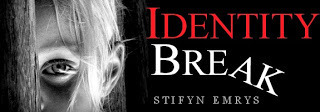
Published on February 01, 2013 15:02
January 12, 2013
There's Far More to Paganism than Worshiping Gods and Goddesses

Pagan fundamentalism.
These two words aren't generally seen together, but that may be about to change - and yes, it worries me. It worries me greatly.
In the past week or so, there's been a movement to either 1) remove disassociate polytheism from Paganism in general or 2) identify Paganism as exclusively polytheistic.
The first of these ideas involved a personal decision by Star Foster, a well-known blogger in the Pagan community, to discard the "Pagan" label while continuing to identify as a polytheist. This was somewhat confusing to me, as polytheists always seemed to be Pagan by definition, in much the same way that Anglicans are Christian by definition. One is a subset of the other.
Though I found this puzzling, I want to make one thing clear: I've always respected and defended the right of self-identification. If someone wants to identify merely as a polytheist without reference to Paganism, that's entirely a matter of personal choice - and such personal choices should be respected, even where they may not be entirely understood.
That's why I find the second development - the suggestion that Paganism is, or should be exclusively polytheistic - far more troubling. This view is being advanced in a blog titled Bringing Back the Gods by P. Sufenas Virius Lupus.
In this extensive blog, the author starts out by stating that "one of the points of modern Paganism is to bring back the gods."
The problem with this statement is that it lumps all Pagans into the same category. Certainly, plenty of people were attracted to Paganism for this reason, but many others weren't. Some other reasons people are attracted to Paganism include its balance between masculine and feminine, a reverence for nature (more on this in a bit), a disenchantment with monotheism, an interest in the mystical, a desire to better understand one's self, etc. I could go on.
Worse than this, however, is the fact that Lupus goes on to specifically denigrate "nature worship" as fitting "perfectly with the Christian conception (and, as in my case, misconception) of ancient polytheists as unsophisticated bumpkins with no place in civilized society."
There are so many problems with this statement, it's hard to know where to begin.
First of all, should Pagans really be expected to define themselves based on whether or not their behavior reinforces Christians' false impressions of them? That's certainly not how I want to define myself. I'd much rather be proactive than reactive. Second, Lupus appears to be setting up "nature worship" as a sort of straw man for pantheism. News flash: This is offensive. It's very much akin to Christians calling polytheists "idol worshipers."
The author then proceeds to denigrate pantheists further by stating that "Nature doesn't care if you make offerings, hold festivals or sing its praises and dance and feast with your friends." Again, the author is mimicking the perspective of the fundamentalist Christian vis-a-vis polytheism. Just substitute a couple of words in the previous sentence, and you get this: "False gods don't care if you make offerings, hold festivals or sing their praises and dance with your friends."
Suddenly, the author's view on pantheism looks very much like the fundamentalist Christian's view of polytheists.
Lupus attempts, near the end of his blog entry, to cushion the blow by demurring that he is "not against" religiosity that focuses on "nature, self, or community." But he then goes on to state, definitively that "Modern Paganism should not have, as one of its major goals, a self-presentation defined by 'nature worship.' "
Had Lupus said that his own personal practice does not have this as one of its major goals, that would have been all well and good. The problem here isn't Lupus' personal beliefs - he's as welcome to them as I am to mine and Star Foster is to hers - it's his presumption in seeking to make that statement on behalf of everyone who identifies as Pagan.
Where does this leave secular, cultural, symbolic, philosophical or pantheistic Pagans, all of whom has every bit as much right to call themselves Pagan as Star Foster has to eschew that label?
Three letters: S.O.L.
Sorry if that's crude, but the point needs to be made, and it needs to be made forcefully: P. Sufenas Virius Lupus has no more right to define any individual Pagan's personal belief than I do. This is not the Catholic Church. We aren't subject to the Nicene Creed or any other dogmatic statement of belief. Indeed, the absence of such dogmatism is what attracts many people to modern Paganism - perhaps more so than what apparently attracted Lupus, "bringing back the gods."
Dogmatics such as this are dangerous, whether they're elucidated in a Christian framework, a Pagan framework or any other context. Polytheists excluding all others on the basis of dogmatic statements is simply unacceptable - and it would be just as unacceptable if pantheists were to adopt the same position with regard to polytheists.
We've gone down this road before.
Indeed, Pagans are just now starting to make progress in educating the public at large that Wicca isn't a synonym for Paganism - that Paganism encompasses a much broader collection of beliefs, practices and philosophies. On the cusp of this achievement, will the "purist" polytheists drag the entire community once more into the morass by declaring that all Pagans are (or must be) worshipers of many deities - when this simply isn't so?
If we start down this road, what's next? Will one pantheon be elevated above another? Will it be acceptable to revere the Celtic gods but not the Greek or Sumerian? Are Egyptian deities to be excluded because they're often represented with animal heads (or wings), and are therefore too close to "nature"?
Who decides? A blogger? A high priest? A self-appointed "expert." Or does each individual have the right to self-identify and worship (or not worship) as he/she sees fit?
I would argue strenuously for the latter. There's room enough in the Pagan community for polytheists and pantheists; for worshipers and philosophers; for Wiccans, Druids, mystics and secularists. When a community starts excluding people because some leader or another doesn't like the way they worship, pretty soon people start labeling these "others" as heretics, excommunicating those who don't agree with them and conducting witch hunts.
Yes, we've been down this road before.
And it never ends well.

Published on January 12, 2013 13:12
December 30, 2012
Amazon Review Section: Breeding Ground for Trolls and Bullies?
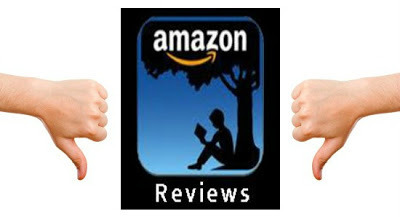
Here's the latest on my continued battle with Amazon over its review guidelines, which are, unfortunately, biased toward allowing uninformed, negative reviews - and against positive reviews.
Amazon's guidelines contain an extensive, five-point section that defines the kind of "promotional content" that's not allowed, but it includes nothing to prevent trolls from bullying authors with caustic, negative reviews. There's nothing to prevent people who haven't read your book from going off ad nauseam on how bad it is without backing up their statements with actual examples of what they find offensive.
These are not reviews. They're attacks, and they shouldn't be allowed.
Yet Amazon allows them.
It's pretty clear that this is one of those cases of "you can't fight city hall" - city hall, in this case, being Amazon. But as someone who believes it's important to combat bullying, I can't simply sit by and allow authors to be bullied by trolls who may not even have read their books. That may be fine with Amazon, but it's not fine with me.
After two positive reviews were removed from my books and two negative reviews were allowed to remain, despite their clear mean-spirited nature, I sent an e-mail to Amazon quoting its own guidelines about not allowing "spiteful remarks" in an attempt to restore some sense of equity and civility to the process. I was, predictably, rebuffed. Below is my initial inquiry, followed by Amazon's response:
I am contacting you because I am concerned about that a reviewer appears to be violating your policy against spiteful language in reviewing my books. Sissy McMillan has reviewed only two books in the past four years, and both have been mine. She has given scathing reviews to both, which leads me to believe I am being targeted. Here is her review of my book "The Gospel of the Phoenix":
"I can't believe I was sucked in by this - and I can't get my money back because I did try to read it. Save your time and your money and avoid this boring trash like the Plague!"
There is nothing specific about the content of the book, which leads me to believe she hasn't even read it. In a comment on a review of another book, "Undefeated," she states, "I have seen the stupid and boring writing of this 'author'," once again without any indication she has read the book. She claims to have borrowed the book, but it's not available for borrowing on Amazon and isn't in wide circulation, so this (her claim) seems unlikely, especially considering her lack of specifics.
I understand the value of negative reviews, but negative reviews that merely characterize a work in general, spiteful terms without any specifics as to why the book falls flat seem inappropriate. Thank you for your attention to this matter.Amazon's response:
I've read the reviews submitted by "Sissy McMillan" for the books titled "Undefeated: Overcoming Prejudice with Grace and Courage" and "The Gospel of the Phoenix: Another Revelation of Jesus." I understand your concerns, but these reviews do not violate our posted guidelines, so I'm unable to remove them in their current format.
However, as the author of these titles, you can provide feedback about the reviews by voting or commenting on them. To vote, click the "Yes" or "No" buttons next to "Was this review helpful to you?" To comment, click the Comments link at the bottom of each review.
We try to encourage our customers to give their honest opinions on our products while staying within our guidelines. As a retailer we are interested in cultivating a diversity of opinion on our products. Part of that is allowing our customers to air their honest thoughts on items they have received.
Apparently, it's OK with Amazon if those "honest thoughts" are unsubstantiated attacks, but it's not OK if they're positive comments. Amazon, it seems, has signaled its intent to be a breeding ground for trolls and mean-spirited attacks (as opposed to constructive, healthy criticism). Defending attacks on the pretext that they are "honest thoughts" is merely a means of condoning bullying. If you agree with me, here's what you can do to make your voices heard.
Whenever you run across a mean-spirited review, mark it as unhelpful and report it as a violation of Amazon's guidelines. Forcing Amazon to spend staff time responding to your requests costs them money. Even if they refuse to act, you will be forcing them to pay a penalty, however small, for perpetuating this unfair policy.Mark positive reviews as helpful when they are, in fact, helpful.Mark comments that are rude, personal attacks or unsubstantiated as "unhelpful."Offer positive reviews to any books you have read and liked.Do this whenever you're on Amazon and run across these reviews. Authors put a lot of time and care into crafting their books, and the fact that online bullies are permitted to trash someone else's work without providing anything to support their opinions is a gross injustice. In a couple of minutes, they are dismissing months of work. The least they should do is provide a "why" - something Amazon suggests in its review "tips" but does not require - and remain civil.
I take some solace in the fact that I'm not alone. According to a Salon article, amateur "reviewers" have trashed such classics as The Diary of Anne Frank, To Kill a Mockingbird and 1984. Some people seem to enjoy making cutting remarks toward others and their work. Maybe it makes them feel superior. But regardless of their motives, the results promote animosity rather than constructive dialogue and criticism.
Civility appears to be going out the window in our society - and is being given a huge shove by Amazon's current review policy. I encourage everyone to share this blog and others like it that highlight this problem (no, I don't profit from this blog) and e-mail Amazon to protest the policy. The more people protest, the better the chance is that "city hall" will listen. Doing something is better than doing nothing.

Published on December 30, 2012 23:10
December 27, 2012
'Les Miserables' Lands Somewhere Between Soaring and Miserable
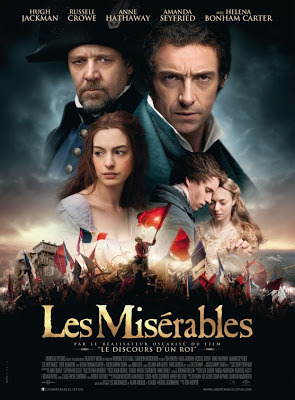
Les Miserables is a long movie. There's nothing wrong with that in itself; the problem is that it feels like a long movie.
I had high hopes for this film based on the previews, but I must admit to being underwhelmed. The sets are grand, the direction is sweeping and the acting isn't bad - some of it is quite good. But the story itself is so melodramatic, at points verging on maudlin, that I couldn't help wonder about the wisdom of making this film as a musical.
Musicals, unless they're titled The Sound of Music or Mary Poppins, often don't translate well to film. Watching a musical performed on stage can be pure joy (George Takei's Allegiance being a great example), but it often loses something when it's projected onto the big screen - much in the same way baseball is best enjoyed at the stadium, rather than on TV.
Part of the difficulty with Les Miserables is that the story itself is somewhat melodramatic, at times verging on the maudlin. The death scenes seem designed to tug at the heartstrings, which has the opposite effect - robbing them of their poignancy. Adding music to the equation only enhances this effect, and it seems at times (particularly in the end) that the story has gone pretty far over the top.
The performances are generally solid. Anne Hathaway almost redeems the movie by herself, because she's a great singer in addition to a believable actress in the role of Fantine. She's the most realistic, sympathetic character in the film by a long way. But she's only in the first third of the picture. Many of the other characters to be represent some aspect of human existence, rather than being full-fledged human beings in their own right. Javert is "the law," Jean Valjean is "the virtuous martyr," Cosette and Marius are that well-worn staple of "star-crossed love at first sight."
Among the other actors, Russell Crowe is believable as Javert, and Hugh Jackman shows his chops as an actor (if not so much as a singer) as Jean Valjean. When he asks, "Who am I?" once or twice in the film, however, I couldn't help seeing him as Wolverine uttering a similar line in the X-Men series. Sacha Baron Cohen is delightful in a comic relief role, where he and Helena Bonham-Carter play well off each other as a sort of 19th-century cross between Bonnie and Clyde and Fred and Ethel.
Still, I far prefer the 1998 (non-musical) version with Liam Neeson, Claire Danes and Geoffrey Rush. That film is just as long as the current incarnation, but it doesn't seem as long. It's not a musical, so while it retains the story's inherent sense of unbridled angst and recrimination, it isn't amplified by the inherent emotionalism of a musical discourse.
To be sure, some of the music in the current release is powerful and moving. Fantine's musical soliloquy early in the movie is a great example. But the fact that virtually all the dialogue is sung blunts some of the impact that might have been achieved by setting moments like this more clearly apart from spoken conversation.
Many will enjoy Les Miserables, and there's much to enjoy (it is, after all, a very long movie). It just didn't turn out to be my particular cup of tea.

Published on December 27, 2012 21:03



